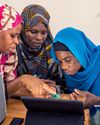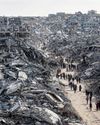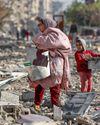
The reason for that gap between us is that I am writing these words before the start of Rosh Hashanah, the Jewish new year, which began at sunset last Wednesday.
By tradition, Jews are supposed to refrain from all work for the 48 hours that follow, work defined to include not only updating newspaper columns but watching the news on TV or checking your phone. I suspect I will not be the only Jew who will have struggled to comply with that stricture this year.
But you don't need a crystal ball to know that whenever that Israeli response comes, opinion will divide instantly and sharply, with two radically opposed views of what has just happened - mapping on to two wholly opposed views of Israel itself. That divide is part of what made this perhaps the hardest Rosh Hashanah that all but the oldest Jews can remember, one that came at the end of a dark and terrible year.
Here's what I mean about those two different views of Israel. There's the Israel you see on the news: the mighty bully, wildly lashing out at its neighbours, that, not content with turning much of Gaza into rubble, has now rolled its tanks into Lebanon - apparently for no better reason than because it can. This Israel is the one indicted by the world's courts, where it is accused of the most heinous crimes. This Israel has, for a year, brought out millions in mass demonstrations in the major cities of Europe, the US and beyond, a scale of protest unseen for two decades, politicising a generation that has decided that opposition to Israel is the great issue of our age.
This story is from the October 11, 2024 edition of The Guardian Weekly.
Start your 7-day Magzter GOLD free trial to access thousands of curated premium stories, and 9,000+ magazines and newspapers.
Already a subscriber ? Sign In
This story is from the October 11, 2024 edition of The Guardian Weekly.
Start your 7-day Magzter GOLD free trial to access thousands of curated premium stories, and 9,000+ magazines and newspapers.
Already a subscriber? Sign In

Power play The Solar Mamas who are lighting up Zanzibar
In a dimly lit corridor of a mudwalled house nestled among coconut trees, Sharifa Hussein stripped red and black cables, a screwdriver voltage tester balanced between her lips and rolls of cable lying by her feet.

Play it again and again
Spotify's Billions Club tracks the world's most popular songs, but many greats are nowhere to be found. What are the forces shaping pop's new canon?

David Lynch 1946 -2025
The maverick American surrealist film director sustained a successful mainstream career while also probing the bizarre, the radical and the experimental

Election fever grows ....but Trump is pulling the strings
The machinations of Elon Musk andthe returning US president loom large in minds of politicians and voters

International response America's allies hope for the best-but prepare for the worst
Western allies of the US are braced for the return of Donald Trump, still hoping for the best, but largely unprepared for what may prove to be a chaotic and disorientating worst.

Mood music
Listening to, or playing, the right song can soothe pain, lift depression and help treat conditions as diverse as Parkinson's, Alzheimer's, PTSD and back pain. Neuroscientist and bestselling author Daniel Levitin gives his musical recommendations for better health, drawing on his experience of helping his friend, the legendary songwriter Joni Mitchell.

Gaza's devastation The terrible price exacted by Israel for 7 October attack
Israel began bombing Gaza on 7 October 2023 after Hamas crossed the border, killed about 1,200 people and took 251 others hostage to Gaza.
North Koreans' capture sheds new light on war
The news was sensational.

Fragile truce An agreement is in place-if it will hold matter is another
The hours-long delay in implementing the Gaza ceasefire agreement last Sunday was not a good omen for a deal that many fear could be doomed to failure as it moves through its challenging three phases.

Why did LA's wildfires explode out of control?
Acombustible combination of factors laid the groundwork for disaster as the city struggled with catastrophic blazes